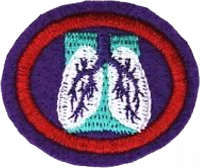Difference between revisions of "AY Honors/Respiratory System/Answer Key/en"
From Pathfinder Wiki
< AY Honors | Respiratory SystemAY Honors/Respiratory System/Answer Key/en
(Updating to match new version of source page) |
(Updating to match new version of source page) |
||
| Line 198: | Line 198: | ||
<noinclude></noinclude> | <noinclude></noinclude> | ||
==References== | ==References== | ||
| − | |||
<noinclude></noinclude> | <noinclude></noinclude> | ||
{{CloseHonorPage}} | {{CloseHonorPage}} | ||
Latest revision as of 23:28, 18 July 2022
Respiratory System
Skill Level
2
Year
2012
Version
04.02.2026
Approval authority
South American Division
1
What are the structures that make up the respiratory system? Illustrate and describe the main functions of each.
2
Are the right and left lungs the same? What is the anatomical difference between them?
3
What are the two main gases of the body? What is gas exchange? Describe the conductive airways up to the point of gas exchange.
4
What is an alveolus and what is its function? Illustrate an alveolus by means of drawings or figures, demonstrating the moment of gas exchange.
5
What is the main function of cilia, including motile cilia?
6
What is the relationship between cellular respiration and pulmonary respiration?
7
Explain how the circulatory and respiratory systems are intimately linked.
8
What is the importance of hemoglobin and iron for the oxygenation of the body?
9
Describe in detail the movements of inspiration and exhalation. Which is the importance of the diaphragm muscle for these movements?
10
Which organ of the central nervous system controls breathing? Why?
11
What is the normal respiratory rate of:
11a
Newborns
11b
Children
11c
Adults
12
Define the following terms about respiratory alterations:
12a
Eupnea
12b
Tachypnea
12c
Bradipnea
12d
Dispnea
12e
Ortopnea
12f
Apnea
13
Study the following respiratory diseases and describe for each: how it occurs/is acquired, transmission (if that is the case), treatment and prevention:
13a
Asthma
13b
Tuberculosis
13c
Pneumonia
13d
Influenza / upper respiratory tract infections
13e
Pulmonary emphysema
13f
Pulmonary thromboembolism
13g
Pneumoconiosis
13h
Cystic fibrosis
14
Research the effects of smoking on the respiratory system. Present your results in one of the following ways:
14a
Written report, at least 500 words
14b
Verbal presentation, at least 5 minutes
14c
Display with posters and signs
14d
Poem or music
15
Conduct a survey in your region or state, comparing the quality indices of the air. How can these indices be improved? What can you do to improve them?



